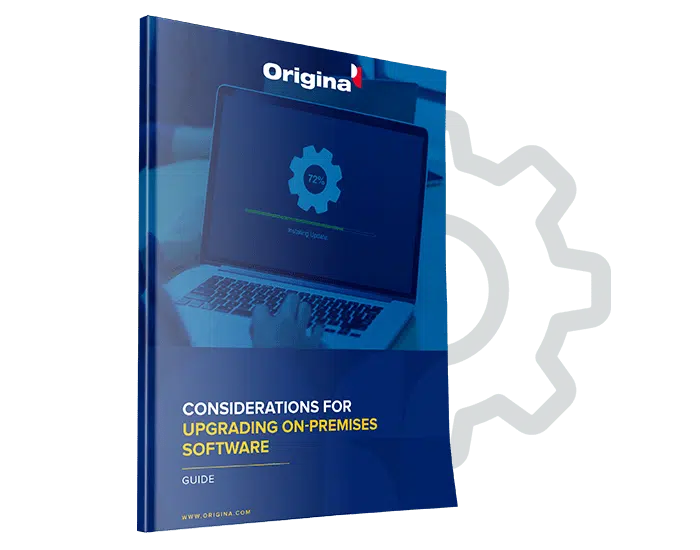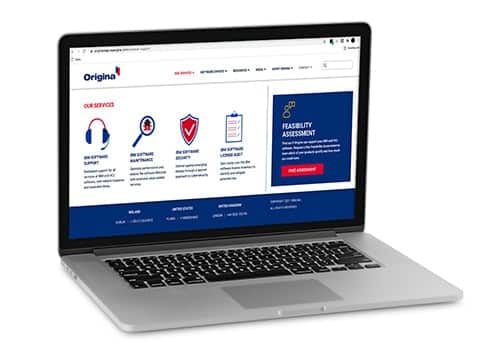Considerations for Upgrading On-Premises Software

Discover why upgrades aren’t always a necessity and learn how Origina helps technical teams accomplish their initiatives. IBM and HCL are quick to point to upgrades as part of the equation for migrations and getting new features, but are upgrades always necessary? We dive into the detail as to whether software upgrades need to be part of the conversation for a given situation.
UPGRADES: NOT ALWAYS NECESSARY
Origina recognizes that there may always be a portion of a companies’ IBM® or HCL software estate that will need to be upgraded to the latest version. However, on average less than 15 percent of customers that switch to Origina are on the latest version – and over 60 percent are three or more versions behind in the upgrade cycle.
Therefore, it’s realistic to say that upgrades aren’t a requirement for every product.
Part of the reason upgrades are viewed as a must-have commodity is that vendor-supplied software support is so often tied to the upgrade cycle. A business can’t log a ticket if the software version isn’t currently being supported, which means it also isn’t privy to newly released Fix Packs and security patches.

Upgrades can potentially interrupt a stable digital estate and introduce new risk. Origina maintains the stability of these environments without disrupting their functionality.
The goal of engaging with Origina is for businesses to explore the financial and operational value of switching software support. Origina will help a company evaluate what the best decision is for its unique technology stack when it comes to delivering long-term value through software support and maintenance.
Origina delivers third-party software support with no strings attached and no matter which version the customer is on. This is achieved through a unique, independent service model that provides access to new features, security fixes and maintains interoperability with the surrounding environment without relying on upgrades to do so.
The following guide helps companies ascertain whether unreleased vendor upgrades are necessary to achieve their goals, or if Origina’s alternative can help the company better support its IT roadmap

ARE UPGRADES NEEDED FOR SUPPORT?
Applications that are marked as End of Support (EoS) aren’t entitled to new Fix Packs or software support, even if a company is paying for extended support. Origina has found that between 20 and 60 percent of the IBM® and HCL software estate that is switched to Origina is EoS, meaning that up to 60 percent of the software that is switched was unsupported to begin with.
It’s an important concept to recognize because IBM and HCL would require a company to upgrade its software to a supported version to receive support. Origina provides full software support for any version at no additional cost.
Companies are free to stay on whichever version is stable and sustaining business operations, without feeling the need to upgrade to what the vendor deems as a supportable version. The freedom enables a business to extend the lifecycle of the software version that’s deployed, which contributes to a high-performing and more secure IT architecture.
CASE STUDY
One of the largest automobile manufacturers in the world struggled to get support for its legacy software from IBM, despite the fact it was under contract. By working with Origina, it was able to receive highly responsive support from independent Global IBM® Experts (GIEs) for that software while cutting the cost in half.
ARE UPGRADES MANDATORY TO GET NEW FEATURES?
When there’s a new feature that will truly add value to the way the organization utilizes the application, the organization should consider upgrading to the latest version.
Given the maturity of enterprise software, newer versions are more than likely to contain marginal improvements in performance or features. This means the desired functionality may not be included in a newer version.
However, as most products Origina supports are three or more versions behind – and a significant percentage are End of Support – a requirement can arise for a new feature. Origina provides the missing functionality through bespoke feature enhancements without infringing on the vendor’s copyright.
Origina uses feature enhancements to develop and deploy the software capabilities customers require without having to resort to upgrades to acquire them. These are delivered by Origina’s GIEs and can be turned around in as few as seven business days.
As a part of the onboarding process, all entitled software versions will be captured. Where a feature is available on a version that a customer is entitled to, Origina can assist a customer in upgrading to that version even after switching.
CASE STUDY
Origina works with a Fortune 100 U.S. pension fund company that used IBM® OpenPages. The business planned to migrate away but needed to export nine years of historical financial data before it could decommission the application.
The version that OpenPages was on did not support exporting. IBM advised the customer that the feature was on a newer version of the software, but it would have to incur a reinstatement fee of four-times the cost of the annual software support. Paired with the costly upgrade project that would be attached to it, the company decided that was too high of a price to gain access to an export feature that would only be used once on a decommissioned application.
After scoping the project, Origina’s GIEs delivered the export feature within seven days, including deployment and testing.
ARE UPGRADES ESSENTIAL TO MAINTAIN SOFTWARE COMPATIBILITY WITH THE DIGITAL ESTATE?
Enterprise software is stable enough to run for decades, but the surrounding environment will change. Each new piece of technology that’s introduced will need to be tested and strategically configured to ensure existing IBM® and HCL applications continue to run unencumbered.
As a result of the software’s longevity, businesses may run into issues surrounding interoperability. When these issues arise – and, if the application version isn’t officially supported by the vendor – companies could feel obliged to upgrade.
In over 70 percent of support cases, Origina’s customers engage with the GIEs on issues arising from their peripheral environment. These are configuration changes or interoperability between applications. Origina has extensive experience in resolving these issues without the need for upgrades.
As such, Origina does not require customers to upgrade in order to maintain compatibility with IBM® or HCL software and the surrounding environment. If the software version isn’t officially supported, Origina’s GIEs will work closely with the customer’s technical teams to ensure it’s able to operate without error in its current capacity.
CASE STUDY
Origina works with British Telecom (BT) to support its IBM® software. The company acquired EE in 2016, which was formed via a merger between Orange and T-Mobile in 2010.
EE ran a customized version of IBM® Informix, which was complex to maintain but needed to integrate with a new digital estate in BT. Origina’s GIEs were able to guide BT through any technical issues stemming from the acquisition and the migration that followed, as well as provide responsive software support moving forward.
ARE UPGRADES NECESSARY FOR PRODUCT MIGRATIONS?
Moves to microservices, migrations to the cloud and digital transformation projects in general are part of the long-term IT strategy for every organization. By 2025, 75 percent of enterprise organizations expect to be on cloud models for over 90 percent of their software, according to Gartner.
Organizations transitioning to new infrastructure must ask themselves if upgrading to the latest version will provide a return on investment. If the value won’t be realized before decommissioning the software, the business should evaluate whether the most recent version of the software is required.
As the IT landscape evolves, Origina supports organizations through the design of, and execution on, product and cloud migration plans. Origina ensures that throughout the process, the IBM® or HCL software deployed on-premises doesn’t slow or impede any progress and that it can be maintained and integrated for as long as is necessary.
CASE STUDY
Origina worked with a global pharmaceutical manufacturer that was migrating from IBM® Cognos to SAP BusinessObjects. Before it was able to deploy SAP BusinessObjects, it faced the prospect of having to renew the contract and upgrade it to a supported version of Cognos just to keep it running for the handful of months the company would be using it.
By switching to Origina, the business was able to avoid getting locked into a lengthy contract that would require it to upgrade. Instead, Origina supported the current version of Cognos and assisted with the migration to BusinessObjects, saving the company $728,000 in the process. The savings it gained were expected to cover the entire cost of completing the global migration.
ARE UPGRADES STILL AVAILABLE AFTER SWITCHING TO ORIGINA?
Switching IBM® or HCL software support to Origina does not mean that a company loses access to upgrades or can never upgrade to a newer version.
Origina customers will download the software versions and Fix Packs they’re entitled to before moving away from IBM or HCL. Businesses that decide that they want to upgrade to a version that they are entitled to can deploy that version while with Origina.
In the event of a customer needing a new version that it’s not entitled to, the customer will have options. IBM and HCL allow companies to reinstate for a fee which is typically three times the cost of IBM® or HCL S&S. Origina’s pricing analysis team will explore the real possibility of this being a requirement and if savings would still be realized in this event. These scenarios will be accounted for before switching to Origina so that customers gain complete confidence that they can deliver long-term value, support, and maintenance.
However, throughout the time that Origina has supported its customers across many thousands of applications, no company has ever wanted or needed to go back to IBM or HCL for support or to upgrade to the latest version. Origina has always been able to support companies’ shifting priorities and keep IBM® or HCL software operational and integrated. In many instances, Origina is able to provide the functionality of newer versions without upgrading through feature enhancements.
BENEFITS OF THIRD-PARTY SOFTWARE SUPPORT
Learn why Fortune 500 companies switch to Origina.
- Fixed-Cost Savings
- No Forced Upgrades
- Proactive Cybersecurity
- Maximize ROI
- Support For All Versions
- Reliable, Dedicated Support
get better software support for your business
See how much you could save by switching to Origina
